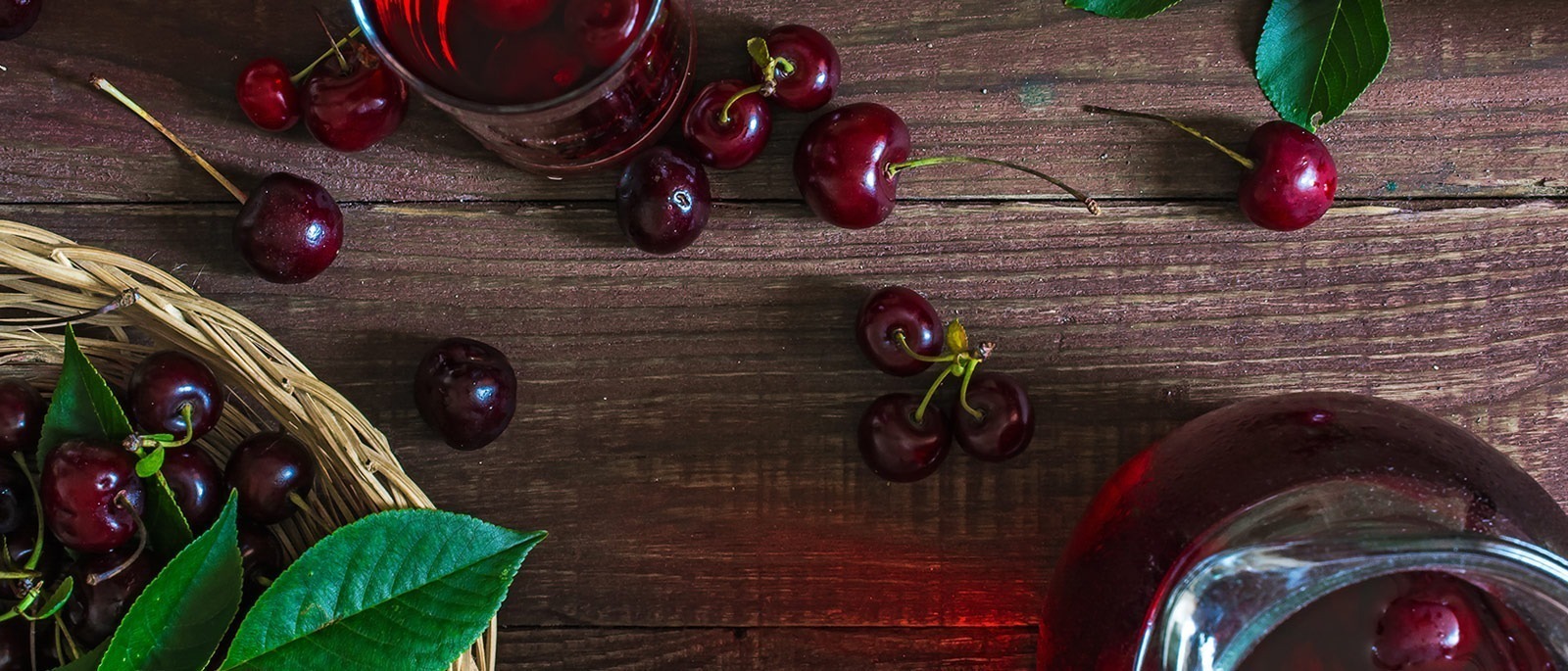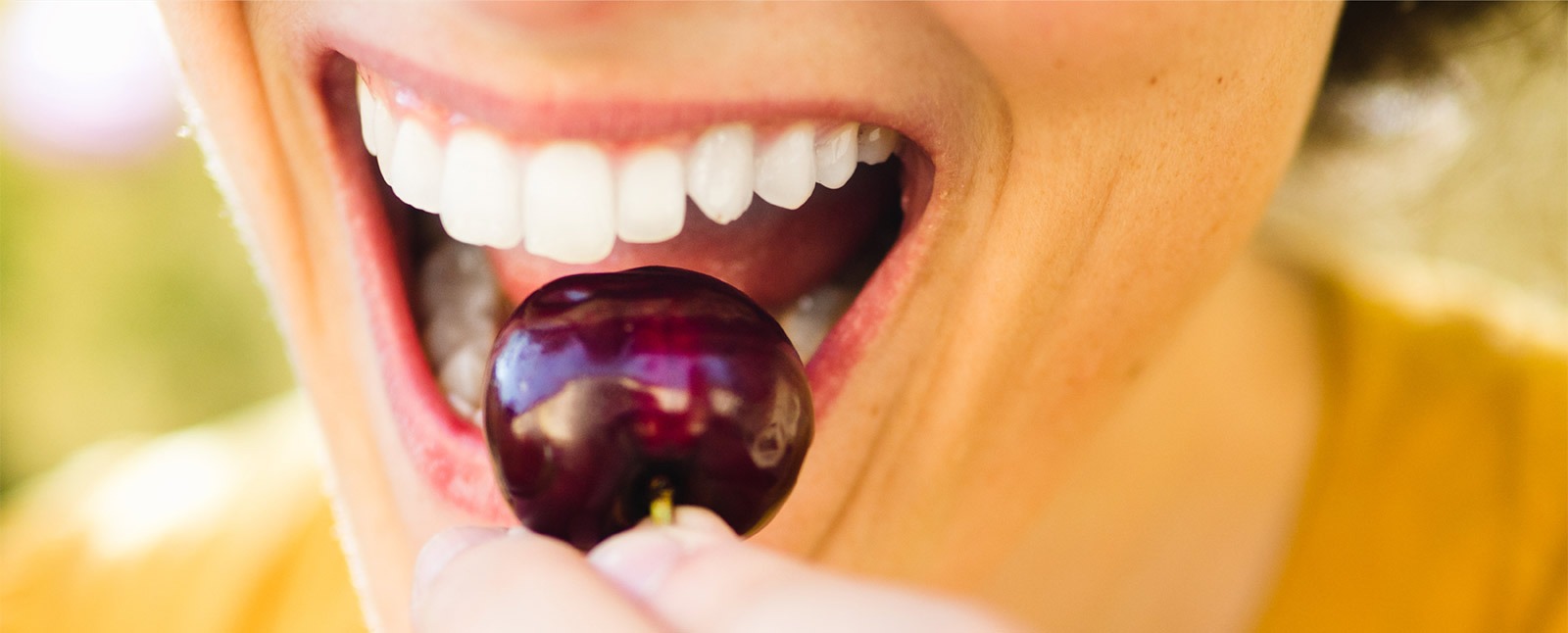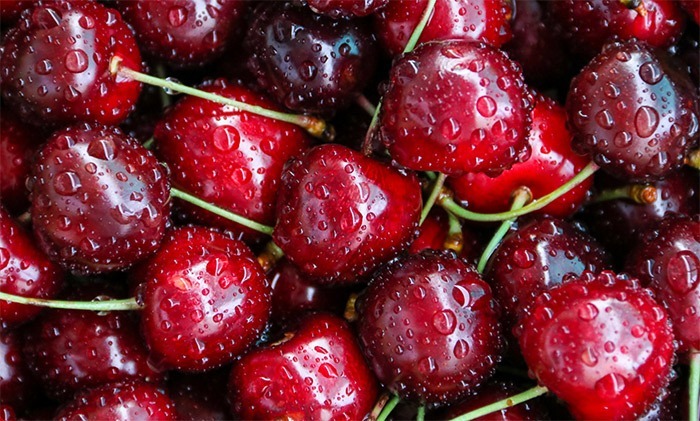
SLEEP BETTER
FIGHT INFLAMMATION
GET MORE FIBER
FIGHT INFLAMMATION
GET MORE FIBER
Cherries are packed with polyphenols, vitamins, minerals and bioactive compounds that offer a variety of anti-inflammatory and antioxidant properties. Thanks to the unique nutrient composition of this fruit: Adding cherries to your eating pattern can be a health-promoting habit that helps to decrease oxidative stress by reducing chronic inflammation; improve sleep, and reduce risk of chronic disease (including heart disease, cancer, diabetes and cognitive decline) over time.
CHERRIES ARE THE
POWERHOUSE FRUIT OF THE SUMMER
Sweet cherries are more than a treat; they are a powerhouse ofgoodness! Sweet cherries boast an abundance of antioxidants,vitamins and minerals, making them a true superfruit. Their vibrant red hue is a testament to their high antioxidantcontent, which helps combat harmful free radicals andpromotes overall well-being. Loaded with vitamin C, sweet cherries help boost your immune system and assist in keepingyour skin glowing. These marvelous fruits also contain potassium, promoting heart health and contributing to maintaining healthy blood pressure levels.


HEALTHIER SKIN. REDUCED STRESS. BETTER SLEEP.



6 WAYS SWEET CHERRIES HELP YOU STAY HEALTHY
KEEP PAIN AT BAY WITH ANTI-INFLAMMATORY PROPERTIES
Sweet cherries contain anthocyanins, which appear to shut down enzymes that cause tissue inflammation in a similar manner to ibuprofen and naproxen. Increased inflammation is the underlying cause for numerous chronic human diseases, such as:
Arthritis • Diabetes • Cancer Hypertension • Cardiovascular disease
Biomarkers of these diseases and C-reactive protein, a common marker of inflammation, have been reduced in human studies of cherry consumption.
A TASTIER WAY TO FIGHT CANCER
TAKE THE BITE OUT OF GOUT ATTACKS
SWEET CHERRIES, SWEETER DREAMS
SNACK ON A SWEET SOURCE OF FIBER
A cup of sweet cherries delivers about three grams of fiber, or about 12% of the daily value from USDA Dietary Guidelines. Just two cups of fruit daily can contribute to healthy weight maintenance, diabetes prevention and improved cardiovascular health.
A SWEET FIX WITHOUT BUSTING GI LEVELS

STUDIES SHOW...
BLOOD PRESSURE
- Hypertension is a risk factor in cardiovascular disease, and studies suggest phenolic acids found in cherries and produced by anthocyanin metabolism exert vasorelaxing and antihypertensive effects. 2
CANCER
- In lab studies, the phenolic compounds of sweet cherries appear to inhibit breast cancer cell growth without toxicity to normal cells.3
- Sweet cherry extracts have been shown to inhibit proliferation of colon and breast cancer cells in several published studies4
- Sweet cherries contain perillyl alcohol – shown to be capable of inhibiting pancreatic, breast, liver, colon, skin and lung cancers – which raises the fruit’s anti-carcinogenic activity.5
CARDIOVASCULAR DISEASE (CVD)
- Anthocyanins found in foods like sweet cherries inhibit lipid peroxidation, which has a hand in reducing CVD risk factors.6
- Anthocyanin interference with inflammation pathways can help in prevention of CVD.7
COGNITIVE FUNCTION
- Improved brain and visual function may result from anthocyanin’s interference in inflammation pathways.8
- Anthocyanins appear to exert neuroprotection, resulting in a beneficial effect on cognitive decline and neurodegeneration associated with aging.9
- Consumption of anthocyanins from cherries appears to improve memory and cognition in older adults with mild-to-moderate dementia.10
DIABETES
- The polyphenols in cherries appear to help diminish hyperglycaemia, oxidative stress and inflammatory markers that are predictors of diabetes mellitus.11
- Cherry extracts reduce glucose blood levels and protect pancreatic beta-cells from oxidative damage, enabling them to continue balanced production of insulin.12
GOUT
- Consumption of cherries can significantly decrease plasma urate, which provides anti-gout efficacy. 13
- Phenolics appear to interfere with the oxidative process as free radical terminators, ultimately decreasing formation of volatile decomposition products that contribute to gout.14
- Sweet cherries compared favorably to NSAID controls using ibuprofen and naproxen to alleviate gout symptoms. 15
INFLAMMATION
- Eating cherries significantly decreased C-reactive protein and nitrous oxide concentrations, both known pro-inflammatory factors.16
- Consuming cherries was found to decrease plasma concentrations of eight biomarkers associated with inflammatory diseases (CRP, ferritin, IL-18, TNFα, IL-1Ra, ET-1, EN-RAGE and PAI-1).17
- Polyphenols in cherries may minimize or prevent inflammation and oxidative stress, which may be risk factors for diseases like arthritis, diabetes, cancer and hypertension.18
SLEEP
- The presence of tryptophan, serotonin and melatonin in sweet cherries interact with cherry phenolics to help regulate sleep cycles.19
STRESS
- Cherry phenolics appear to protect neuronal cells from cell-damaging oxidative stress.20
- Various studies have shown serotonin is an important neurotransmitter that reduces stress and improves mood.21
- “Sweet and sour cherries: Origin, distribution, nutritional composition and health benefits.” Federica Blando and B. Dave Oomah. Trends in Food Science & Technology 86 (2019) 517-529.
- Blando, et al.
- “Dark sweet cherry (Prunus avium L.) phenolics as dietary chemopreventive/therapeutic compounds for aggressive breast cancer cell growth with no toxicity to normal breast cells.” Layosa MA, Lage NN, Martens-Talcott SU, Talcott St, Pedrosa ML, Chew BP and Noratto GD.
- “Nutrients, Bioactive Compounds and Bioactivity: The Health Benefits of Sweet Cherries.” Ana C. Gonçalves, Catarina Bento, Branca Silva, Manuel Simões, Luís R. Silva. Current Nutrition & Food Science, 2019 15, 208-227.
- Gonçalves, et al.
- Blando, et al.
- Blando, et al.
- Blando, et al.
- Blando, et al.
- “Acute reduction in blood pressure following consumption of anthocyanin-rich cherry juice may be dose-interval dependant: a pilot cross-over study.” Katherine Kent, Karen E. Charlton, Andrew Jenner and Steven Roodenrys. International Journal of Food Sciences and Nutrition, 2016, 67:1, 47-52.
- Gonçalves, et al.
- Gonçalves, et al.
- Blando, et al.
- “Is there a role for cherries in the management of gout?” Marcum W. Collins Kenneth G. Saag, Jasvinder A. Singh. Therapeutic Advances in Musculoskeletal Disease, 2019, Vol. 11: 1-16.
- Collins, et al.
- “Consumption of ‘Bing’ sweet cherries lowers circulating concentrations of inflammation markers in healthy men and women.” Kelley, D. S., Rasooly, R., Jacob, R. A., Kader, A. A. & Mackey, B. M. Journal of Nutrition, 2006, 136, 981–986.
- “Sweet Bing Cherries Lower Circulating Concentrations of Markers for Chronic Inflammatory Diseases in Healthy Humans.” Darshan S. Kelley, Yuriko Adkins, Aurosis Reddy, Leslie R. Woodhouse, Bruce E. Mackey and Kent L. Erickson. The Journal of Nutrition, American Society of Nutrition, 2013, doi: 10.3845/jn.112.171371.
- Kelley, et al., 2013.
- Gonçalves, et al.20 Blando, et al.
- Blando, et al.
- “The consumption of a Jerte Valley cherry product in humans enhances mood, and increases 5-hydroxyindoleacetic acid but reduces cortisol levels in urine.” María Garrido, Javier Espino, David González-Gómez, Mercedes Lozano, Carmen Barriga, Sergio D. Paredes, Ana B. Rodríguez. Experimental Gerontology, 2012, 47, 573–580.


